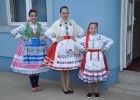Cultural Institute of Vojvodina's Slovaks presented its work in Novi Pazar
With a goal to develop awareness and to substantiate the roles and functions of the National councils of the national minorities in Serbia many programs and contents with which the councils are dealing have been organized, for example education, informing, official language and sripts and culture of national minorities. In consideration of the fact that Bosnian national minority which is concentrated in Sandžak is expecting an election for the National council, the Organization for cooperation and safety in Europe (OSCE) by means of Mission in Serbia, has had three round- tables intro which there have been done searchings for forming -up- place and possible solutions for look up and development of Bosnian society.
One of theese round-tables was held on March the 28th in Novi Pazar and it was about culture of minority communities as much as about the development of cultural politics and darning of the cultural institutions. The cultural public of Bosnians or to be more precise the prominent personalities and cultural could hear about examples from the good practice from Vojvodina, where there are twelve National councils of national minorities and since the year of 2008 there are five minority Institutes.
Photo: ÚKVS |
Milina Sklabinská the director of the Cultural Institute of Vojvodina's Slovaks presented the Institute and the programs which it developes, with a goal to preserve and improve the Slovak culture in Serbia. The moderator of the round- table was a journalist Dinko Gruhojnić who highlighted the Vojvodina's Slovaks portal as a great way of presenting the whole cultural potencial of one minority. Also about the competency of National councils in the field of culture spoke the director of Cultural Institute of Vojvodina's Russniaks Miroslav Keveždi who underlined the meaning of these highest legal and legitimistic minority institutions when it comes to creating and implementing the cultural politics of a minority. The pleasant representatives of Bosnian cultural institutions have positively evaluated the work of both Institutes and they did not hide their sympathies for the Slovak culture, which they consider as expanded and prim.
Photo: ÚKVS |
In a comprehensive debate there were observations made about challenges with which the Bosnian minority is facing in the field of culture and also the existing solutions which could provide a continual and specialistic work in the cultural area. The cooperation of relevant institutions are the key for preserving the cultural heritage and the development of contemporary artistic forms. In that kind of atmosphere it could be talked about the possibility of founding the Cultural Institut of Bosnians, for which existence there already is an elaborated plan which could become actual in the upcoming period.
Due to shown interest of the representatives of cultural institutions and cultural activists from Novi Pazar this kind of exchange of positive experiences will proceed.
|
Next round-table will be dedicated to official language and lettering.
Milina Sklabinská


































